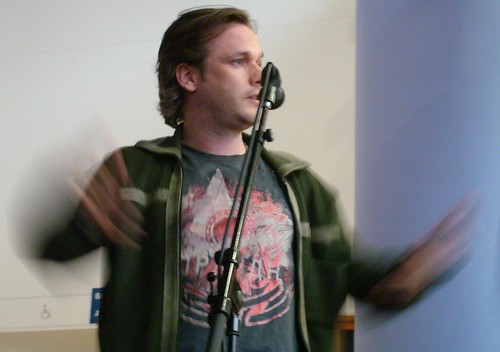
Rob Bell did most of the speaking. But he had some guests too.
The surprise guest guest was Zach Lind, drummer from Jimmy Eat World. (You can find his blog
here) Rob interviewed him about the creative process of song writing, and then applied that to the creative process of sermon writing. The biggest take-away from that was that writing a good song or sermon doesn't just happen. It often takes much working and re-working.
That was probably more fun than helpful.
Peter Rollins was one of the other guest speakers. He had two one-hour sessions. The first he was interviewed by Rob, the second he just spoke. Peter was really funny and charming (with his thick Irish brogue).

Peter, however, might be one of the reasons that so many evangelicals are nervous about all things Emerging. (I'd argue that the biggest reason is that evangelicals get nervous is that they are group that is labeled. Any time that happens, the labeled group is seen as new and therefore unorthodox. But that's a discussion for another day.)
Peter is absolutely mad. I would say that there is a method to his madness, but many will never be able to see beyond the madness. He speaks quickly, rapidly dropping bombs of provocation. He speaks with far more question marks than periods.
I'd argue he is more a performance artist than a preacher. If you understand him in that way, it makes much more sense. Let me give you an example: For Lent, he instructed his group to give up God. For those 40 plus days, they did not read the Bible or pray. Instead they read atheist writers like Freud and Nietzsche. Already, he may have lost you. But by the end, he talked about how a need and a hunger for God had been created.
That's Peter Rollins in a nutshell. His performance art carries the danger of being misunderstood, but it also carries a tremendous potential to speak in ways that a speech canot. The best things I got from him were two illustrations (maybe I'll share them another day) and the motivation to try to work in more performance art into service (attentive to the dangers, of course). His books may be worth reading just to inspire creativity.

The other guest speaker, Shane Hipps, pastors a Mennonite church of about 300 in Arizona. Before he became a preacher, he worked for a marketing firm that had accounts with Porsche and others. As a part of that work, he did much research into how people think in the effort to coerce them into buying whatever his firm was pimping. He left that behind, but now carries some important warnings about what unintentional messages are media carry.
You can can catch the heart of his first message
here (It's a 5:40 video) or in an articel he wrote
here. (You might want to check out some of
the other interviews about virtual community too).
The infromation he gave in his first session should be required for any student of preaching. Really good. Really important.
Since he contends that the medium is the message, his second session was about what kind of message do you as medium convey (beyond the text of your sermon, of course).
That session was confusing to me. I found his blog and asked him to explain the ideas from his second session more. You can find his response
here. He deserves a lot of credit for responding so quickly and graciously. I'm still probing more, because it is new to me. I want to know more about what he means before I swallow it whole or deny it completely, or (more likely) do something between those extremes.







